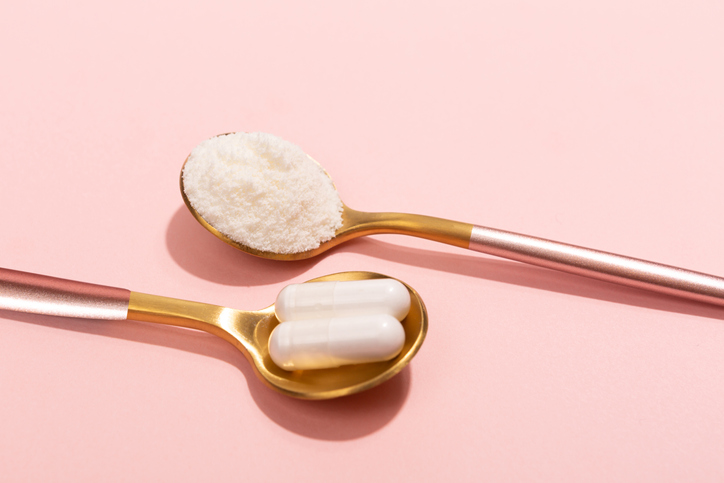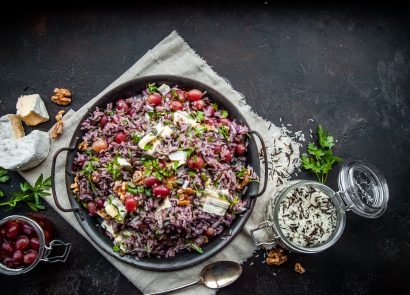If you’re a keen follower of beauty trends, then you won’t have missed the fact collagen is having a moment right now. Said to help improve our skin’s elasticity and slow down the signs of ageing, supplements containing the building blocks of this important protein are being hailed as the secret to a younger complexion. It’s a big promise, but you’ll be pleased to know that science does seem to be on its side. “In 2021 an important systemic review was published in the International Journal of Dermatology showing clear and consistent benefits of oral collagen supplementation for skin health,” says Dr Johanna Ward, a cosmetic doctor and GP, and founder of skincare and supplement brand Zenii (zenii.co.uk). “Results include improved skin hydration, improved skin elasticity, improved collagen production and a reduction in fine lines and wrinkles.” Sounds good, right? However, with so many different products out there promising to revitalise our skin, things can get a little confusing. To help shed light on the matter, we’ve spoken to the experts to get the lowdown on everything you need to know…
Collagen is the glue that holds our body together
So, first thing’s first, what exactly is collagen and how does it work in our body? “Collagen is the body’s most abundant structural protein,” says Dr Ward. “It’s the substance that holds the body together and provides scaffolding and strength to virtually every tissue in our body – the hair, skin, nails, joints, bone, cartilage and blood vessels all depend on collagen for their structure and integrity.”
It’s what makes our skin look supple and smooth
It’s this idea of structure and integrity that makes collagen so useful when talking about beauty. As Sara Waterman, senior aesthetician at beauty and skincare destination Young LDN (youngldn.com) tells us, the protein has a key role to play in how our skin appears. “Collagen makes up more than 80 percent of our skin and it’s what gives the skin its elasticity and firmness,” she says. In basic terms, this means it’s collagen that helps our skin to retain its tightness, and gives our complexion a smooth, wrinkle-free and youthful look.
Our levels decrease as we age
As Sara explains, our body makes collagen by combining amino acids together in a process that also requires vitamins and minerals in the form of vitamin C, zinc and copper. “Amino acids are nutrients you absorb from eating protein-rich foods like beans, legumes, fish, beef, chicken, eggs and dairy,” she adds. However, as we age, our body’s ability to absorb and synthesise these nutrients becomes less effective, and so we begin to produce less collagen – hence why our skin often changes as we get older, and can begin to sag and wrinkle.
“This gradual decline in production starts as early as our mid 20s and continues throughout our whole life,” says Dr Ward. “It’s thought that collagen depletes at a rate of one percent per year and research indicates that by the age of 40 the body’s ability to produce collagen will have decreased by 25 percent. And, by the age of 60, it has decreased by over 50 percent.” Ouch! But luckily, there are ways we can boost our body’s levels of collagen.
Collagen supplements can help our skin
Enter, the huge range of collagen supplements now available on the market. “There are many different types of collagen supplements,” says Sara. “These can come in the form of powders or liquids, which you add into your morning smoothie, and they also come in easy capsules to take with your daily vitamins. When ingested, they deliver essential amino acids and nutrients to the dermis (the deeper layer of the skin) to stimulate fresh collagen production.”
Keen to try it yourself? Dr Ward suggests looking for a few key features when choosing oral supplements. “Collagen supplements need to be high strength (ideally 10,000mg per day) and need to be hydrolysed (broken down into small bio available amino acids) so that the body can make use of it,” she advises.
Collagen supplements can help our skin
Enter, the huge range of collagen supplements now available on the market. “There are many different types of collagen supplements,” says Sara. “These can come in the form of powders or liquids, which you add into your morning smoothie, and they also come in easy capsules to take with your daily vitamins. When ingested, they deliver essential amino acids and nutrients to the dermis (the deeper layer of the skin) to stimulate fresh collagen production.”
Keen to try it yourself? Dr Ward suggests looking for a few key features when choosing oral supplements. “Collagen supplements need to be high strength (ideally 10,000mg per day) and need to be hydrolysed (broken down into small bio available amino acids) so that the body can make use of it,” she advises.
There are three main types of supplements
When looking at collagen supplements, you’ll find three main types: bovine, porcine and marine. “These are all forms of animal collagen, sourced from the bones, tendons and skins of cattle, pigs or fish and processed into a powder or gel of sorts for you to then add to your morning coffee or smoothies,” says Sonia. It’s important to know that consuming them doesn’t automatically boost your own levels though, your body needs to break it down first to then build its own collagen.
Different types can help with different things
Here’s where it gets really interesting – the different types of collagen supplements out there can do different things for you. “There are 27 different types of collagen protein in the body, but type 1, 2 and 3 and 5 are the most prominent forms of collagen and they each benefit your body in their own way,” says Sonia. “Bovine and porcine collagen helps build collagen type 1 and 3 which are predominantly found in your skin and help reduce the appearance of fine lines and wrinkles and help to plump your skin. Marine collagen boosts the production of collagen type 1 and 2. This will again help increase collagen production found in your skin, but can also help with joint health as this where collagen type 2 is predominantly produced.”
You can also buy vegan offerings
Vegans and vegetarians, don’t despair – there are plenty of options for you to discover too. “While collagen is something that exists in animals (pigs, fish, cattle and humans are filled with the stuff), all animals need plant-based nutrients to actually build collagen in the first place,” says Sonia. “Vegetarian and vegan collagen supplements are packed full of powerful collagen-building nutrients predominantly sourced from fruits, veggies, nuts and seeds. I personally prefer vegan and veggie collagen supplements because they are usually minimally processed and all the nutrients found in them are sourced entirely from the wholefood matrix.”
All adults can benefit from supplements
Think you need to wait until your 50s to enjoy the benefits of supplements? Think again! “In reality, collagen supplements can be taken by any adult, and should ideally be taken from your mid-twenties onwards to keep your collagen levels high, as this is when you naturally start to lose collagen naturally,” says Sonia. “The mistake most people make is to wait until their fine lines and wrinkles are visible on the surface of their skin and by this point, it usually takes longer for collagen supplements to work as the rate at which collagen is produced is much lower.”
You can boost your levels with the right diet
There’s not much that good nutrition can’t help with, and our collagen levels can certainly benefit from the right sort of diet. “In order to build collagen, we need adequate amounts of the right building blocks (amino acids) and co-factors (vitamins and minerals),” says Daisy York, a nutritionist at nutritional therapy clinic Aegle (meetaegle.com). “This is where nutrition is important – the body can’t produce collagen if it doesn’t have the necessary elements.” As Daisy explains, quality protein sources (such as meat, dairy, eggs, fish, legumes and tofu) help ensure your body has adequate amounts of the amino acids required, and it’s important to balance this with vitamin C (found in citrus fruits, cauliflower, garlic and green vegetables) and copper and zinc (from nuts, wholegrains, beans and shellfish).
…And by certain lifestyle choices
To keep your collagen levels as high as possible, our experts recommend looking after your body by wearing sunscreen through the year, cutting down on the amount of sugar you consume and making sure you’re properly hydrated. Good sleep is also key. “Ensuring you’re getting an adequate eight hours of sleep is essential to maintaining high levels of collagen because most of your collagen production and skin repair happens when you sleep,” Sonia explains.


















